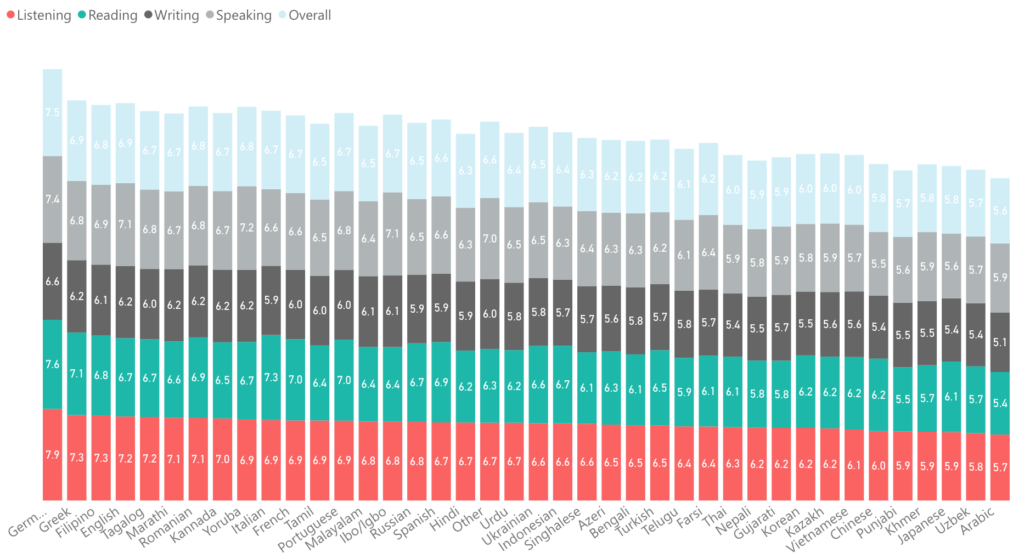Introduction to the speaking test
- 20 minutes
In this lesson, we look at what you need to know about the speaking test.
Average score for the most common first languages
If you would like to see more statistics related to the IELTS exam you can click here.
How are you assessed?
You are assessed on four categories:
This refers to your ability to speak confidently and arrange your ideas well.
What will increase your score:
- Being able to clearly explain and organise your ideas.
- Using words to organise you ideas. For example: however…/ that’s why…/ what I mean is…/ another reason is that…/
- Being able to speak confidently for long periods of time.
What will decrease your score:
- Repeating yourself.
- Regularly correcting yourself.
- Hesitating. For example, spending a long time saying ‘umm’ and ‘ehhh’ while you think of an answer.
- Stopping speaking because you can’t think or explain an idea.
This refers to your ability to convey your ideas with the appropriate words.
What will increase your score:
- Using appropriate vocabulary.
- Using natural vocabulary.
What will decrease your score:
- Making mistakes in word choice.
- Trying to use high-level words unsuccessfully.
This refers to your ability to structure your sentences accurately to convey your ideas.
What will increase your score:
- Using grammar naturally to communicate your ideas.
What will decrease your score:
- Making mistakes in your grammar.
This refers to your ability to use the speed, tone and rhythm of your voice to convey your ideas.
What will increase your score:
- Speaking at different speeds to communicate your ideas.
- Emphasising certain words to communicate your ideas.
- Speaking clearly so that you can be easily understood.
What will decrease your score:
- Being unable to produce certain sounds.
- Pronouncing words incorrectly.
- Speaking at the same speed all the time (like a robot).
To get a high score in Lexical resource (vocabulary) you need to have a large vocabulary. However, this does not mean that you should try to impress the examiner with advanced vocabulary. Candidates that do this always end up using words incorrectly.
Instead, you should spend a lot of time and effort learning a lot of vocabulary but speak naturally during the speaking test.
Frequently asked questions about the speaking exam
No. You cannot bring in any device to check the time. Some students worry that they will not know how long they have spoken for in part 2. Don’t worry- the examiner will tell you when to start and stop speaking. You should focus on talking until you are asked to stop.
Asking questions in Part 1
- You can ask the examiner to repeat something: ‘Can you repeat that please?’
- You cannot ask any questions in part 2.
- You cannot ask to change topic.
- You cannot ask about how much time is left.
- The examiner will tell you when to start speaking and when to stop.
- You can ask the examiner to repeat something: ‘Can you repeat that please?’
- You can ask the examiner to ask the question in another way: ‘Sorry, I don’t quite understand that’
- You can ask the examiner what a certain word is: ‘Sorry, what does _____ mean?’
- You cannot ask the examiners opinion or experience.
- You cannot ask the examiner to change the question.
At the end of the test
- You cannot ask the examiner for your score or any feedback. They are not allowed to give this to you.
All of the parts of the speaking test are as important as each other. The examiner will decide your score at the end of the speaking test.
You should speak at your natural speed. The most important thing is that you talk naturally. When you speak naturally you will often change the speed of your voice to communicate your idea- this will improve your score.
In part 2 the examiner says: I’d like you to speak for one to two minutes.
However, it is important that you speak for two minutes. You should speak until the examiner tells you to stop. If you speak for less than two minutes you can get a lower score.
You should not try to shake hands or hug the examiner.


